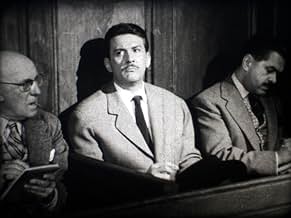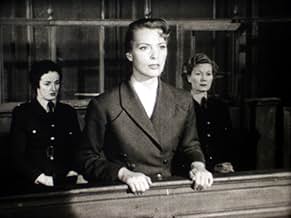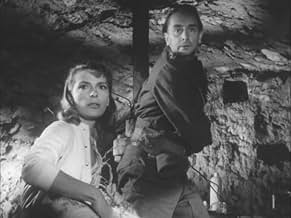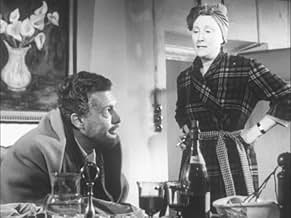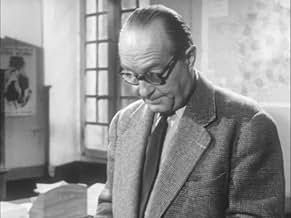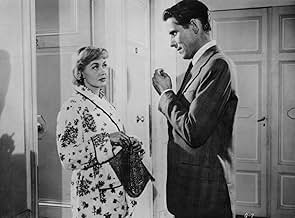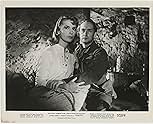Je plaide non coupable
- 1956
- Tous publics
- 1h 33min
NOTE IMDb
5,9/10
136
MA NOTE
Ajouter une intrigue dans votre langueA Frenchwoman accused of the murder of her child's father in an English court, rejects her defence lawyer. At the request of a Frenchman who saved his life during the war, a family solicitor... Tout lireA Frenchwoman accused of the murder of her child's father in an English court, rejects her defence lawyer. At the request of a Frenchman who saved his life during the war, a family solicitor reluctantly takes on the case.A Frenchwoman accused of the murder of her child's father in an English court, rejects her defence lawyer. At the request of a Frenchman who saved his life during the war, a family solicitor reluctantly takes on the case.
- Réalisation
- Scénario
- Casting principal
Andrée Debar
- Vicki Martin
- (as Andree Debar)
André Mikhelson
- Santos
- (as Andre Mikhelson)
Félix Clément
- Maire Gimelet
- (as Felix Clement)
Marcel Lupovici
- Valdi
- (as Lupovici)
Avis à la une
A strange french film that I saw dubbed, from an US source. It begins like a court drama, where a young woman is accused of a murder and claims her innocence. A journalist tries to prove her not guiltiness. And the films curiously becomes from time to time an actionner, with some gunfights sequences. Not a bad feature, but that I will forget in a couple of weeks, or maybe days. I don't know any of the actors, male or female. It may be a sleeper at some moments, so stay tuned if you want to follow the story in an accurate way. The director was a man who made films in different countries: UK, USA and France. His best known feature was LES MAINS D'ORLAC.
I saw this film this morning, 5th September 2018, on Talking Pictures which I often watch these days when there is garbage on most other tv channels. It was a long film and I found myself looking at the clock several times to check when it ended.One example of the producers casting British actors so us anglo saxons can understand the script, was " the vital French witness" played by Sidney Tafler who gave testimony just before the jury gave its verdict.Phony French accents were the order of the day when even ignorant French peasants spoke intelligible English.More intelligent producers later would provide English subtitles whenever a non English part was spoken on film, thus providing more verisimilitude, a classic case being Darryl F Zanuck's remarkable "The Longest Day"(1962) which had sequences in French & German.The film seemed long because, as a previous reviewer has said there were too many flashbacks in the Criminal Court sequences. when he played a RAF fighter pilot and I agree with the previous reviewer who wrote continual flashbacks broke the continuity of the scenes.The only previous film in which I had seen the leading man was in Leslie Howard's "The Gentle Sex" (1945) when he played a RAF fighter pilot.I even found myself thinking in schoolboy French what I would have said in their authentic language.The plot was rather contrived by the scriptwriter being merely adequate, henc emy rating of 6/10.
The British TV channel Talking Pictures recently screened this film. It wasn't perfect quality, and twice I had stop my recording, reverse and freeze to read a scribbled note.
The plot was divided between a hotel where a murder took place, a courtroom at London's Old Bailey and France (with echoes of the German occupation). It was not at all bad, though a couple of times I did wonder how the French reporter had come up with information to progress the investigation he was making with his friend Nat Rumbold.
As always with court dramas, one might wonder at some of the legal procedures, not least the last-minute intervention. And there were one or two scenes that could have been improved, such as that with the out-of-control car, when interior reaction shots of Nat realising he had a problem could have been effectively added.
But overall the film was good enough to have merited a better-known cast. Donald Wolfit (later to be knighted) as the judge was the biggest - indeed the only big - name, and there was a sprinkling of familiar British character actors.
Everyone acquitted themselves well enough.
It would appear that the film was released in both English and French, and a poster on IDMB gives prominence to the French actors.
The plot was divided between a hotel where a murder took place, a courtroom at London's Old Bailey and France (with echoes of the German occupation). It was not at all bad, though a couple of times I did wonder how the French reporter had come up with information to progress the investigation he was making with his friend Nat Rumbold.
As always with court dramas, one might wonder at some of the legal procedures, not least the last-minute intervention. And there were one or two scenes that could have been improved, such as that with the out-of-control car, when interior reaction shots of Nat realising he had a problem could have been effectively added.
But overall the film was good enough to have merited a better-known cast. Donald Wolfit (later to be knighted) as the judge was the biggest - indeed the only big - name, and there was a sprinkling of familiar British character actors.
Everyone acquitted themselves well enough.
It would appear that the film was released in both English and French, and a poster on IDMB gives prominence to the French actors.
This film soon splits into two parallel narratives; one a rather stolid courtroom drama with an eclectic cast of Britons ranging from Donald Wolfit as the judge to Betty Stockfield as a shifty witness, the other populated largely with French actors and slickly shot by director Edmond Greville following hero John Justin to France in search of evidence exonerating a former resistance heroine.
Based on a novel by Michael Gilbert (originally part of his Inspector Hazelrigg series), the plot is often hard to follow and the final payoff a bit of a letdown, but you keep watching.
Based on a novel by Michael Gilbert (originally part of his Inspector Hazelrigg series), the plot is often hard to follow and the final payoff a bit of a letdown, but you keep watching.
Although made in the mid fifties, it has the appearance of being made in the mid 30s. And then there's the contrived action sequences, reminiscent of a 1940's Republic Films Superman or Johnny Mack Brown serial for kids. Lotsa laughs. One is led to believe that if the male lead should unexpectedly visit one of those Parisian street toilets, three thugs would be waitlng inside ready to pounce on him. They should have had Graham Moffatt, Charlie Chan or Buster Keaton put in an appearance to round it all out. For anyone thinking of getting into the film business, this film should be an inspiration that anyone can write a script, act or direct. What a load of Tripe,...Glorious Tripe !
Le saviez-vous
- AnecdotesVeteran extra Aileen Lewis is not only the policewoman standing in the dock behind Andrée Debar, she's also in the public gallery sitting towards the back on the right hand side of the screen.
- GaffesWhen Rumbold is photographed leaving the post office, the photographer is to his right but the photograph shown soon after was clearly taken from his left.
- ConnexionsReferenced in Sous le plus petit chapiteau du monde (1957)
Meilleurs choix
Connectez-vous pour évaluer et suivre la liste de favoris afin de recevoir des recommandations personnalisées
Détails
- Date de sortie
- Pays d’origine
- Langues
- Aussi connu sous le nom de
- Guilty?
- Lieux de tournage
- Beaconsfield Film Studios, Station Road, Beaconsfield, Buckinghamshire, Angleterre, Royaume-Uni(studio: made at Beaconsfield Studios)
- Sociétés de production
- Voir plus de crédits d'entreprise sur IMDbPro
- Durée
- 1h 33min(93 min)
- Couleur
- Rapport de forme
- 1.37 : 1
Contribuer à cette page
Suggérer une modification ou ajouter du contenu manquant

